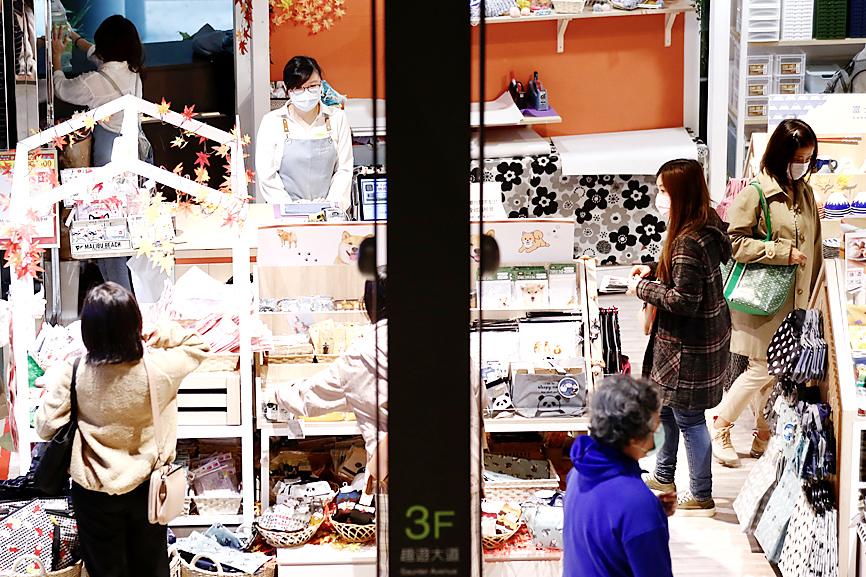Consumer sentiment weakened slightly this month as Taiwanese gained more confidence about stock investments and income levels, but lost interest in purchases of durable goods, a National Central University survey showed yesterday.
The consumer confidence index fell two points from last month to 70.9, the survey found.
“The surge in COVID-19 infections around the world is taking a toll on consumer confidence, even though people in some countries started to receive vaccine shots,” said Dachrahn Wu (吳大任), director of the university’s Research Center for Taiwan Economic Development, which conducted the survey.

Photo: Ritchie B. Tongo, EPA-EFE
The confidence reading on purchases of durable goods, mainly real estate, slumped 13.55 points to 111.65 after various government agencies early this month introduced unfavorable policies to curb property price hikes.
Survey respondents were also expecting to face more difficulty in finding jobs, with the index falling 2.85 points to a decade low of 61.95, it said.
The nation’s job market is still under the effects of the COVID-19 pandemic, especially tourism-related businesses, but electronics suppliers have benefited from the remote-working and learning economy, government data have shown.
Wu expects the adverse effects of the pandemic to persist through the first half of next year, when mass vaccinations are expected to bear fruit.
The consumer confidence index consists of six sub-indices reflecting public confidence over the next six months. Confidence values of higher than 100 indicate optimism and scores lower than the neutral threshold suggest a pessimistic sentiment.
The sub-index on the economic outlook softened a fractional 0.35 points to 84.9, while the gauge on consumer prices decreased 0.2 points to 41.15, as cheaper oil and raw material prices continued to weigh on inflation measures.
Taiwanese also grew mildly more confident about their income levels in the coming six months, with the sub-index rising 1.55 points to 87.15, the survey showed.
The investment sub-index rose 3.4 points to 38.6, as the TAIEX repeatedly rallied to record highs on the back of excessive liquidity. Despite the rise, the figure remained below 40 for the fourth consecutive month and was far lower than the historical average of 73, the research center’s data showed.
Yao Jui (姚睿), an economist at the university, said confidence in the stock market over the next six months is at a relatively low level, due to an already high valuation of the TAIEX, a grim economic outlook amid the pandemic and a K-shaped economic recovery — meaning uneven, but continued growth among different sectors and income groups — in Taiwan this year.
The telephone survey interviewed 2,862 adults from Dec. 18 to Monday last week.
Additional reporting by CNA

Stephen Garrett, a 27-year-old graduate student, always thought he would study in China, but first the country’s restrictive COVID-19 policies made it nearly impossible and now he has other concerns. The cost is one deterrent, but Garrett is more worried about restrictions on academic freedom and the personal risk of being stranded in China. He is not alone. Only about 700 American students are studying at Chinese universities, down from a peak of nearly 25,000 a decade ago, while there are nearly 300,000 Chinese students at US schools. Some young Americans are discouraged from investing their time in China by what they see

MAJOR DROP: CEO Tim Cook, who is visiting Hanoi, pledged the firm was committed to Vietnam after its smartphone shipments declined 9.6% annually in the first quarter Apple Inc yesterday said it would increase spending on suppliers in Vietnam, a key production hub, as CEO Tim Cook arrived in the country for a two-day visit. The iPhone maker announced the news in a statement on its Web site, but gave no details of how much it would spend or where the money would go. Cook is expected to meet programmers, content creators and students during his visit, online newspaper VnExpress reported. The visit comes as US President Joe Biden’s administration seeks to ramp up Vietnam’s role in the global tech supply chain to reduce the US’ dependence on China. Images on

Taiwan Transport and Storage Corp (TTS, 台灣通運倉儲) yesterday unveiled its first electric tractor unit — manufactured by Volvo Trucks — in a ceremony in Taipei, and said the unit would soon be used to transport cement produced by Taiwan Cement Corp (TCC, 台灣水泥). Both TTS and TCC belong to TCC International Holdings Ltd (台泥國際集團). With the electric tractor unit, the Taipei-based cement firm would become the first in Taiwan to use electric vehicles to transport construction materials. TTS chairman Koo Kung-yi (辜公怡), Volvo Trucks vice president of sales and marketing Johan Selven, TCC president Roman Cheng (程耀輝) and Taikoo Motors Group

New apartments in Taiwan’s major cities are getting smaller, while old apartments are increasingly occupied by older people, many of whom live alone, government data showed. The phenomenon has to do with sharpening unaffordable property prices and an aging population, property brokers said. Apartments with one bedroom that are two years old or older have gained a noticeable presence in the nation’s six special municipalities as well as Hsinchu county and city in the past five years, Evertrust Rehouse Co (永慶房產集團) found, citing data from the government’s real-price transaction platform. In Taipei, apartments with one bedroom accounted for 19 percent of deals last